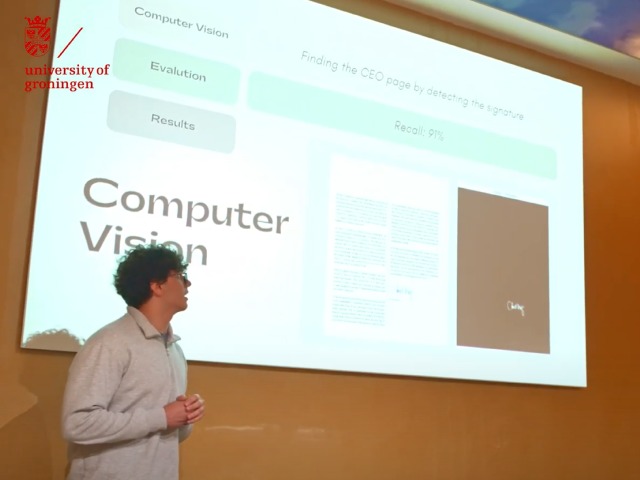Data Science & Society Field Projects: A Closer Look
| Date: | 08 August 2024 |
| Author: | Erika Compatangelo |

In their second semester of their second year, Data Science & Society (DSS) students dive into an exciting, semester-long Field Project with partner organizations. These hands-on projects challenge students to tackle real-world, data-driven problems, giving them a chance to sharpen their skills and boost their professional expertise. In this blog post, we have gathered insights from students and external partners to showcase the mutual benefits of this collaboration.
Student Projects
Imaji and Victor undertook projects with Datamaran and the Centraal Bureau voor de Statistiek (CBS), respectively. Datamaran is an AI platform designed to help business leaders navigate ESG (Environmental, Social, and Governance) issues, represented by Jerome Basdevant, CTO and Co-founder. CBS, or the Dutch Central Bureau of Statistics, is tasked with collecting and processing data for statistical reports, represented by Barteld Braaksma, Innovation Manager.
Imaji, Victor, could you describe your projects?
Imaji: At Datamaran, our project involved developing an algorithm to automate the identification of key sections in ESG reports, particularly focusing on CEO or chairman letters. Currently, this process is done manually and is time-consuming. Automation would allow the annotators to focus on more meaningful tasks.
Victor: My project was to create an interactive map to assess flooding risks from a socio-economic perspective. This involved tasks like data cleaning, geocoding hospital locations, designing custom color scales, adding geoJSON layers for different statistics, and creating a collapsible legend to enhance usability. The map helps users visualize historical flooding areas alongside socio-economic data to assess potential impacts.
How did the skills required for your projects relate to what you learned in class?
Imaji: While our coursework provided a solid foundation in machine learning, we had to learn new techniques like named entity recognition and computer vision during the project. We got the idea to use computer vision as we started a related course. Regular consultations with our external supervisor, Martin, and Professor Tommaso Caselli, facilitated our problem-solving approach.
Victor: The project presented unique challenges that weren’t covered in class, particularly with geospatial data. However, our prior knowledge and some additional research helped us address these challenges.
Reflecting on your experiences, what stands out?
Imaji: The project was rewarding thanks to the valuable interactions with our partner company. It was a blend of applying existing knowledge and learning new skills. Working as a group on a real-world project was a new experience, and it was fulfilling to see our work potentially benefit the company.
Victor: The biggest takeaway for me was learning from the mistakes and overcoming group difficulties. Facing these challenges in a practical environment prepared us for real-world scenarios. The project was invaluable for enhancing practical skills in data visualization and geospatial analysis.
Did this experience influence your future plans?
Imaji: To be honest, this experience only confirmed my commitment to a career in data science. It was exciting to see theoretical knowledge applied in practice, which has encouraged me to explore various data science applications and identify areas I want to specialize in.
Victor: The project improved my understanding of how a data scientist approaches problems and delivers projects. It was particularly insightful to work with people from diverse backgrounds, which helped bridge information gaps and improve the final deliverable.
External Partners' Perspective
Barteld and Jerome, what motivates you to work with DSS students?
Barteld Braaksma: The university’s energy and resources help us develop new methods. While the students may not be experts yet, they bring fresh perspectives and insights that are valuable and require relatively little effort from us.
Jerome Basdevant: Our recent expansion to Leeuwarden and our connection with the university—alma mater of our CEO—align with our company’s mission. The skills DSS students acquire are directly applicable to our needs.
What value do DSS students bring to your organization?
Barteld Braaksma: Students bring a lot of energy and valuable insights, allowing us to explore topics we don’t usually have the capacity to investigate. This type of collaboration is of high-value for our explorations.
Jerome Basdevant: A team of students tackled a problem we had wanted to address for some time but couldn't due to time constraints. Their work quickly demonstrated the feasibility of a solution, highlighting their creativity and adaptability in a fast-evolving field.
Stay up to date with the latest from Data Science & Society!
Sign up for our monthly newsletter to be the first to know about entry requirements, FAQs, Open Day sign-ups, campus visit opportunities, web classes, and stories from our students, professors, and alumni.
About the author

Ciao! My name is Erika and I am the Content & Data Management Specialist of Campus Fryslân. I was born and raised in Italy and have recently graduated from the MSc in Climate Adaptation Governance. I have been in charge of the blog and all its content since October 2023. My aim is to make this virtual space serve as a logbook for the Campus Fryslân community and as a welcoming introduction for all newcomers. Here, you will find stories from the people of Campus Fryslân to get a taste of what studying here is like and the exciting opportunities it comes with!

